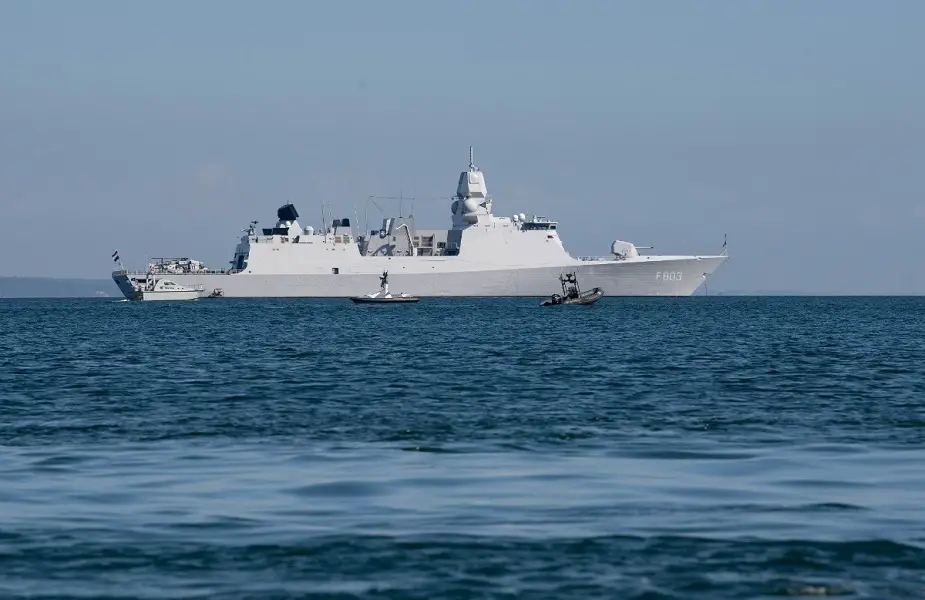Breaking news
NATO forces participate in UK-led Exercise Joint Warrior.
More than 11,000 personnel from NATO countries are participating in UK-led Exercise Joint Warrior. Taking place from 1 to 12 October, the biannual exercise includes defence against simulated attacks above, on, and below the water – extending from Cape Wrath and the Hebrides in the north, to the North Sea and the western Channel.
Follow Navy Recognition on Google News at this link
 The aim of Joint Warrior 22-2 is to provide a complex environment in which the participants can train together, honing tactics and skills in preparation for deployment as a Combined Joint Task Force (Picture source: MARCOM)
The aim of Joint Warrior 22-2 is to provide a complex environment in which the participants can train together, honing tactics and skills in preparation for deployment as a Combined Joint Task Force (Picture source: MARCOM)
Joint Warrior is a UK-led biannual multinational joint and combined exercise that includes 45 ships, 30 aircraft, submarines, land forces, and more than 11,000 troops from the UK, NATO, and Allies. It runs from Oct. 1-12 off the coast of the British Isles.
The aim of Joint Warrior 22-2 is to provide a complex environment in which the participants can train together, honing tactics and skills in preparation for deployment as a Combined Joint Task Force. Participating nations include Canada, Denmark, France, Germany, Italy, Latvia, the Netherlands, Norway, Poland, the United Kingdom, and the United States.
"Joint Warrior is an excellent high-end training opportunity for NATO’s Standing Naval Forces in all maritime warfare areas,” Commander, SNMG1 Commodore Jeanette Morang said. "I’m confident SNMG1 performance will add to the value of the exercise and improve their operational effectiveness as a force in a contested environment with a near-peer opponent.”
SNMG1 and SNMCMG1 will participate in task group roles, building upon the solid foundation already achieved by continuous at-sea operations and multinational training exercises. The scenario for each Joint Warrior is designed to reflect contemporary political tensions to assure maximum preparedness in the face of any threat.
The exercise tests personnel at every level from the command group to each individual unit, while strengthening interoperability across the maritime, air, and land environments. Participants will train on a variety of competencies, including maritime task force training, anti-submarine and anti-surface warfare, air defence, maritime security operations, and media engagement.
SNMG1 currently comprises Royal Netherlands Navy flagship HNLMS Tromp, German Navy FGS Mecklenburg-Vorpommern, Royal Norwegian Navy HNoMS Roald Amundsen and auxiliary vessel HNoMS Maud. French Navy FS Somme will also join SNMG1 to provide exercise support.
Joint Warrior is the second major exercise for SNMG1 since Morang took command of the group in July. It follows exercise Dynamic Messenger 22 held off the coast of Portugal, which focused on operational experimentation with Maritime Unmanned Systems. Joint Warrior will be more challenging from a command and control perspective, optimizing the deployment of the individual ship capabilities while synchronizing efforts across the force to achieve overall military objectives.
“Joint Warrior offers SNMG1 a unique opportunity to train in a very realistic and up-to-date scenario,” Morang said. “I’m looking forward to proving SMNG1 readiness and maritime capabilities to fight in a demanding multi-threat environment and to demonstrate NATO Standing Forces preparedness.”
Commanded by Estonian Navy Commander Ott Laanemets, SNMCMG1 comprises flagship German Navy FGS Mosel, FGS Homburg, HMCS Kingston, HMCS Summerside, HMS Hurworth, LNS Kursis, FS Pegase and BNS Bellis. Most recently the staff of SNMCMG1 participated in operational experimentation exercise Dynamic Messenger 22 in Portugal.
“After Dynamic Messenger, where our focus was purely on mine countermeasures, Joint Warrior allows us to train the supporting disciplines like force protection against air and surface threats, being protected by other ships, and close maneuvers with other ships and aircraft,” Laanemets said. “I am looking forward to integrating SNMCMG1 to wider maritime warfare, because no naval warfare can stand for itself.”
Task groups will rehearse transition of authority to Naval Striking and Support Forces NATO (STRIKFORNATO) to enhance interoperability with NATO command structures.
SNMG1 and SNMCMG1 are multinational integrated task groups that project a constant and visible reminder of the Alliance’s solidarity and cohesion afloat and provide the Alliance with a continuous maritime capability to perform a wide range of tasks, including exercises and real-world operations in periods of crisis and conflict. They report to NATO Allied Maritime Command (MARCOM), located in Northwood, United Kingdom. MARCOM is the central command of all NATO maritime forces and the MARCOM Commander is the primary maritime advisor to the Alliance.



























